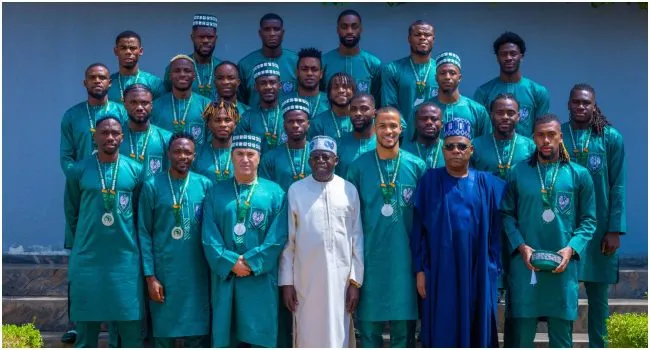After the exhilarating Africa Cup of Nations final on Sunday, football players from Ivory Coast and Nigeria are enjoying the benefits in the form of financial rewards, new homes, and prestigious accolades, but questions are already being raised about increased opportunities for the continent in the World Cup.
The victorious team from Ivory Coast will be awarded $82,000 (£65,000) and a villa of equivalent worth, according to a statement from the presidency. President Alassane Ouattara expressed his joy, stating, “You have brought happiness to all Ivorians, bravo, bravo,” acknowledging the team’s accomplishment as the host of the pan-African tournament.
In light of Nigeria’s unfortunate 2-1 defeat in the final, President Bola Tinubu has decided to generously reward the Super Eagles. Every player on the Nigerian squad receives the prestigious Member of the Order of the Niger award, as well as a flat and a piece of land near the capital, Abuja.
According to local media reports, third-placed South Africa is anticipated to receive around $52,000 per player in addition to their individual rewards.
The precise amount of money that Nigeria’s players will receive from the state is uncertain. However, these additional benefits are offered alongside the regular prize money given out by the Africa Cup of Nations, which has experienced a 40% rise since the previous tournament. Consequently, Ivory Coast, as winners, will receive $7 million, Nigeria as runners-up will get $4 million, and South Africa and DR Congo, as semi-finalists, will each be awarded $2.5 million. Each quarter-finalist will receive a prize of $1.3 million.
This year’s Africa Cup of Nations garnered an unprecedented number of viewers, with nearly two billion people from around the globe tuning in. This historic success is attributed to larger broadcasting and commercial deals, as well as the buzz on social media.
Experts are hopeful that the growing recognition of Africa’s footballing talent on the global stage could result in more World Cup opportunities for African teams down the line. Currently, Africa has only nine World Cup spots compared to Europe’s 13, despite having a near-identical number of FIFA-affiliated countries.
It is worth mentioning that African national teams have previously expressed their concerns regarding delayed salary and bonus payments. It is hoped that the achievements and acknowledgment received by African teams will help tackle these issues in the future.
The disparity in recognition and compensation for African footballers is not a new challenge. After their remarkable quarter-final performance against England in the 1990 World Cup, the Cameroon team had to wait for more than 30 years to finally receive the houses that were promised to them. Unfortunately, by the time they received this long-awaited recognition, their captain had already passed away.
Last year, South African footballers managed to resolve a pay dispute during the Fifa Women’s World Cup by boycotting a match as a form of protest. The impromptu replacements featured a young teenager, underscoring the pressing need to tackle these issues within the realm of football.



